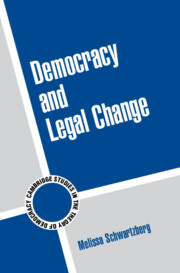Book contents
- Frontmatter
- Contents
- Acknowledgments
- 1 Introduction: Explaining Legal Change and Entrenchment
- 2 Innovation and Democracy: Legal Change in Ancient Athens
- 3 Legislation and Law Reform in Seventeenth-Century England
- 4 Fallibility and Foundations in the U.S. Constitution
- 5 Protecting Democracy and Dignity in Postwar Germany
- 6 Conclusion: Defending Democracy Against Entrenchment
- References
- Index
2 - Innovation and Democracy: Legal Change in Ancient Athens
Published online by Cambridge University Press: 24 July 2009
- Frontmatter
- Contents
- Acknowledgments
- 1 Introduction: Explaining Legal Change and Entrenchment
- 2 Innovation and Democracy: Legal Change in Ancient Athens
- 3 Legislation and Law Reform in Seventeenth-Century England
- 4 Fallibility and Foundations in the U.S. Constitution
- 5 Protecting Democracy and Dignity in Postwar Germany
- 6 Conclusion: Defending Democracy Against Entrenchment
- References
- Index
Summary
Ancient Athenians regarded the capacity to change laws and, generally, to confront contingency with new institutional solutions as a defining characteristic of their democracy. The Athenians' ability to respond to problems by modifying their laws was a source of pride and was widely known throughout the Greek world. Although the Athenians had access to a variety of institutions by which they could have made their laws inflexible, they generally chose not to do so, even in the face of disastrous consequences at the end of the fifth century. The explanation for this choice is found in the Athenian attachment to the progressive ideology of pragmatic innovation, the desirability of modifying institutions in light of new information or changing circumstances, a belief that proved remarkably resilient.
In apparent contrast to this commitment to mutability, the Athenians occasionally used entrenchment clauses, provisions that make laws unamendable. Why would the Athenians, given their attachment to changeable law, choose to restrict themselves in such a stringent fashion, even prescribing death for those proposing modifications? Here, I wish to suggest that the Athenians used entrenchment in highly restrictive contexts: to protect certain financial decrees and alliances and treaties. Although today entrenchment clauses are typically seen in the constitutional context, where they serve to make individual rights and other fundamental institutions unamendable, the Athenians used these provisions exclusively for narrow, strategic purposes in both international and domestic contexts and did not extend them to laws regulating the democracy.
- Type
- Chapter
- Information
- Democracy and Legal Change , pp. 31 - 70Publisher: Cambridge University PressPrint publication year: 2007



